Owning a guinea pig is like having your very own living, cuddly stuffed animal! These funny, gentle, and forgiving animals make the perfect pets for families who want a low-maintenance furry friend to care for and love. Even though many people think of guinea pigs as a pet for children, these animals make the perfect little companions for adults with a lot of love to give, but not a lot of living space to give it in. Find out with us what the current guinea pig prices are, the cost of other supplies you’ll need, and what to expect, good and not-so-good, when you adopt and care for a guinea pig.

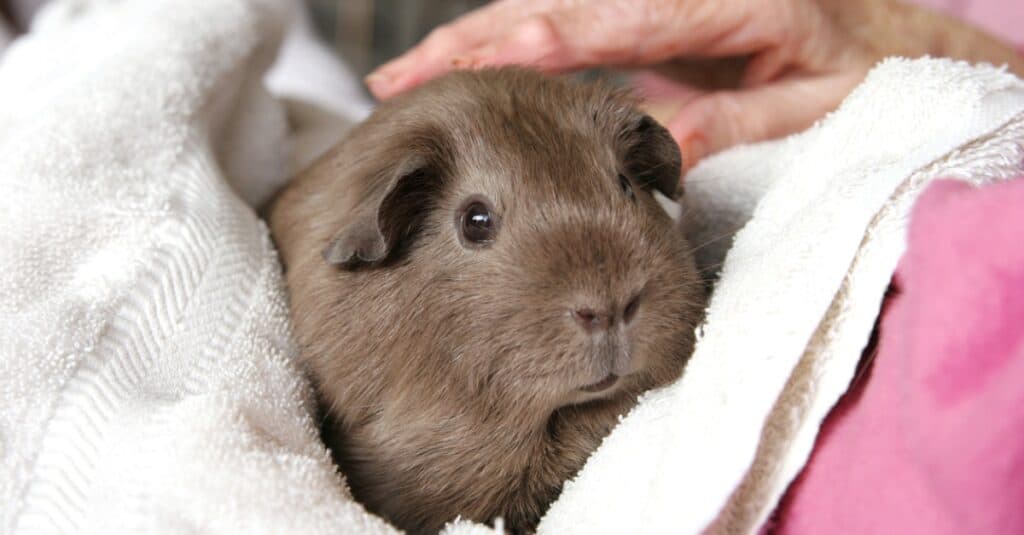
Guinea pigs are highly social animals. They do best in groups of 2 or more, and will happily share their affection with you.
©iStock.com/suemack
What is a Guinea Pig, Anyway?
Guinea pigs are little domesticated rodents native to South America that are 8-16 inches long and weigh 1-3 pounds. They come in hairless, short-haired, and long-haired varieties in solid or variegated shades of black, white, brown, grey, tan, and butterscotch yellow. Hairless guinea pigs are called “skinny pigs.” They have irresistible squishy tummies and buck teeth and express themselves with chirps, whistles, warbles, and other unique vocalizations.

Skinny pigs (hairless guinea pigs), may still have hair on their heads and feet.
©iStock.com/Sompote SaeLee
Where Are Guinea Pigs From?
Domestic guinea pigs are descended from wild species indigenous to the Andes Mountains. They are herd animals that normally stay in family groups of up to ten. They forage along paths continuously looking for things to eat. They are herbivores, preferring grasses, hay, seeds, bark, and sometimes roots – a diet high in fiber and vitamin C. Guinea pigs themselves are food for numerous predators, like wild cats, snakes, owls, hawks, coyotes, wolves, and humans. South American people first domesticated them over 3,000 years ago. Today they are still raised for food by indigenous peoples in Ecuador, Peru, and Bolivia, who sometimes keep them penned, but often allow them to roam freely in and out of their houses. They have been kept as pets in Europe since the 1800s. About 1.5 million guinea pigs are kept as pets in the United States.
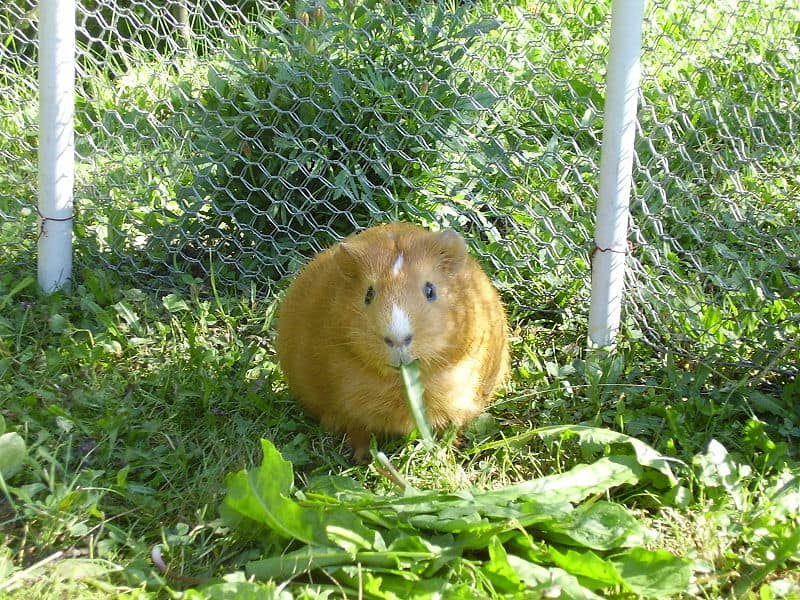
If not caged or fenced, guinea pigs will roam far and wide and face danger from numerous predators.
©Marzper – Public Domain
How Much Does a Guinea Pig Cost?
Purchase Price
On average, guinea pigs cost $25-50 unless you are getting a very rare or show-quality animal. But remember, these are herd animals, so you need to get a minimum of two. Consider checking with your local Humane Society or other shelters and rescues before buying in a store or from a breeder, though. Unlike a rescued dog, which you might fear will require a lot of training to get rid of bad habits and heal trauma from previous poor care, guinea pigs stay contained in a cage and there’s little mischief they can possibly do and no training necessary. A rescue may have a bonded same-sex pair of guinea pigs you can adopt rather than putting two together who do not know each other yet.
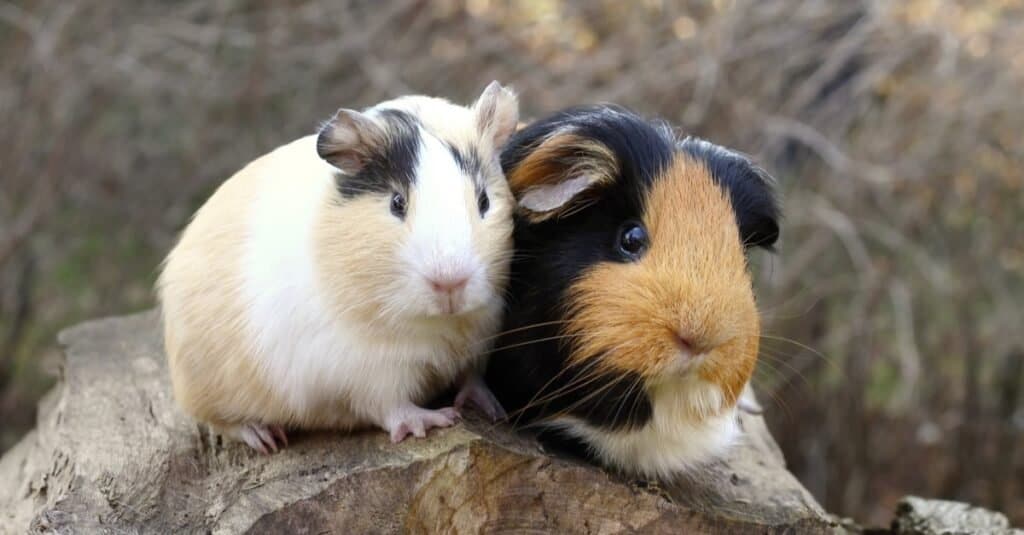
Guinea pigs are social, herd animals. When you adopt a guinea pig at a shelter, ask if they have any bonded pairs of the same gender.
©Miroslav Hlavko/Shutterstock.com
Veterinary Care
Guinea pigs can be taken to a small animal veterinarian once a year for a checkup. They are not usually vaccinated, spayed, or neutered. To be honest, because they are relatively inexpensive pets, many owners are not willing to spend hundreds of dollars on them for veterinary care. Moreover, small animals can be at greater risk from anesthesia than larger ones, and sometimes don’t survive very routine surgeries, such as cyst removal. Birth control for domestic guinea pigs is done by keeping them strictly segregated from the opposite sex. In one recent case in the news, a single male guinea pig was accidentally placed in a large enclosure with rescued female guinea pigs and fathered over 400 babies before the mistake was caught! The average wellness visit for a guinea pig may run between $50 to $100 dollars.
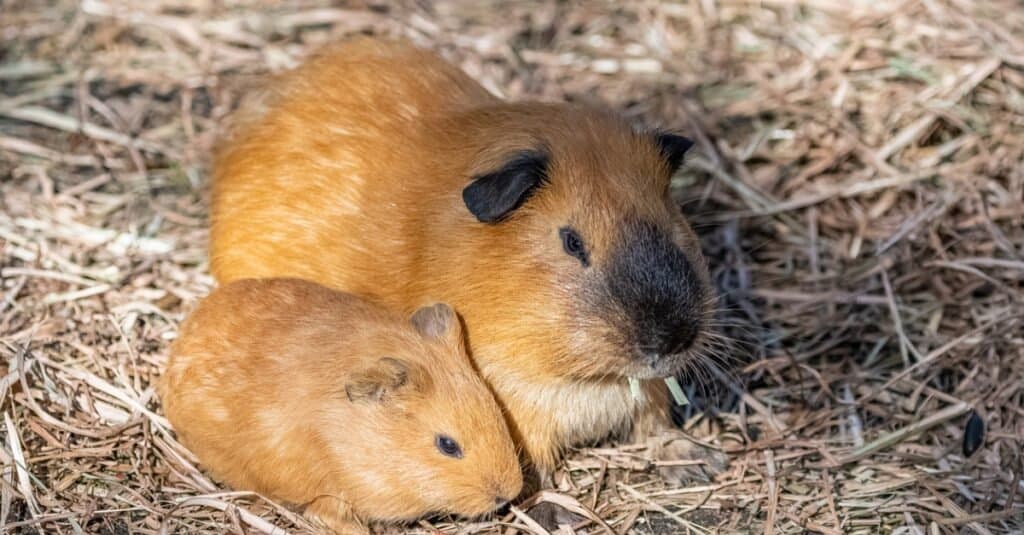
A guinea pig usually has 2-4 babies in a litter and can have 5 litters a year. So if not separated from males, she can have up to 20 babies a year, each of which matures in about 3 months. If this goes on, she can easily end up with 60 offspring: children, grandchildren, and great-grandchildren, in a year!
©iStock.com/Pascale Gueret
What do they Eat?
The mainstay of a pet guinea pig’s diet is feed that comes in pellet form and is specially formulated for guinea pigs, with added vitamin C and other nutrients. However, they also must have a regular supply of hay to chew on to help keep their incisors ground down. Special chew toys can also be provided for this purpose. If your guinea pig’s teeth get overgrown it can cause painful injuries and problems eating and it will have to go to the vet to have them trimmed, which can be uncomfortable. In addition to dry food, guinea pigs appreciate fresh vegetables like celery, carrots, beetroots, kale, cabbage, broccoli, bell peppers, herbs, spinach, zucchini, and more. With a long list like this, it’s tempting to say, “ok, any vegetable is fine,” but in fact, some fruits and vegetables are not good for them. Never give them loose grains, nuts, seeds, dried beans, corn, peas, sweet peas, onions, mushrooms, potato tops, rhubarb leaves, or processed human foods. The only thing guinea pigs drink is water. They should never be allowed to run out of water. You should keep at least two full water bottles attached to the side of their cage at all times.

Feed your guinea pig pellets specially processed for their nutritional needs, along with timothy hay and some fresh vegetables (but only from a recommended list).
©inna f. photography/Shutterstock.com
Habitat and Supplies
Guinea pigs need an enclosed cage measuring a minimum of 30″ x 50″ for two animals. Be sure to get a cage that is made for guinea pigs or other small rodents and it is essential that it have a lid. Guinea pigs are able to jump quite high to escape enclosures when they want to. Each guinea pig needs its own little house or box to hide in, and they need some kind of appropriate bedding on the entire floor of the cage. Bedding made from recycled paper or wood shavings is popular, but make sure if you use wood shavings not to use cedar because of its strong smell, and make sure the shavings are kiln-dried so they will not be toxic to your pets. You can save some money by using a washable cage liner or covering the bottom of the cage with towels, felt, or other absorbent and washable cloth. Be aware, though, that you’ll need to rinse these off outdoors or in a utility sink before putting them in your washer; otherwise, you may find unwanted guinea pig droppings showing up in your laundry from time to time. The guinea pig’s cage, toys, food bowl, and water bottle must be cleaned and its bedding changed a minimum of once a week, with spot cleanings on a daily basis to remove poop pellets and spilled food.
Estimated Supply Costs
Note that the costs in the table below may differ depending on where you live and where you shop. Some owners may want to spend more on toys and treats than others. But this will give you a ballpark figure.
| Supply | Average Cost |
|---|---|
| A wire cage with a covered top, 30″ x 50″ minimum size for two animals. | $85 |
| 2 houses or other hiding places, 1 per animal | $30 |
| 2 water bottles | $20 |
| 2 un-tippable feeding bowls | $20 |
| Bedding or cage liner | $20 |
| Timothy Hay | $30 |
| Guinea Pig feed pellets, with added vitamin C | $10 |
| Nail trimmer | $10 |
| Chew sticks or toys to keep teeth from overgrowing | $15 |
| Total | $240 |

Cleaning and Grooming Your Guinea Pig
Like cats, guinea pigs clean themselves and do not need to be bathed. As long as you keep their cage clean and their bedding regularly changed, they do not have an unpleasant smell. Only the long-haired varieties need brushing, usually just once a week, and maybe a monthly trim to keep their hair from getting tangled or looking crazy. If, on a rare occasion, you do think your guinea pig needs a bath, use a shampoo formulated for small animals, avoid getting it in their eyes or ears, wash them in a shallow bowl of warm water, and dry them thoroughly so they don’t get chilled.
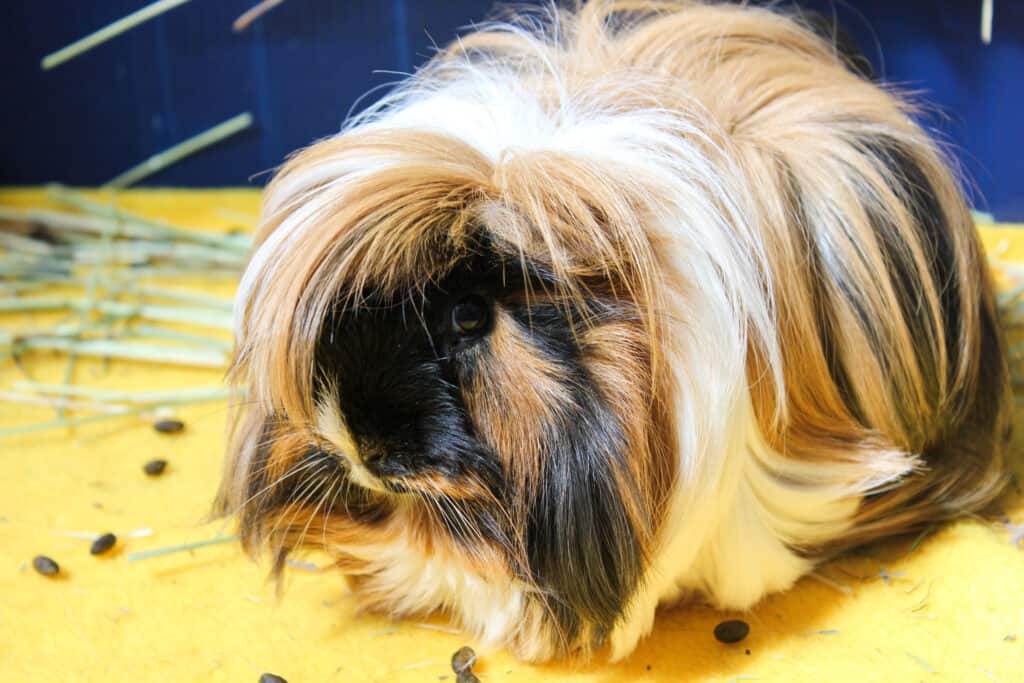
Long-haired guinea pigs require brushing every so often, but no guinea pigs need to be bathed. They clean themselves like cats.
©Nicole Glass Photography/Shutterstock.com
What Makes Guinea Pigs Great Pets?
Here are some of the many reasons guinea pigs make great pets:
- They live 5-7 years, which is a relatively long life expectancy compared to other rodents. With excellent care, they can sometimes live longer.
- They come in a lot of different pleasing colors and patterns.
- They have a strong immune system, are fairly hardy, and tend not to get sick very much.
- Most of the time they are quiet. Exceptions will be when they want to remind you to feed them or they’re excited to see you when you come home. They make a variety of unique sounds, from a high-pitched squeal called “wheeking” to a low chortling sound called “chutting.”
- Guinea pigs are little couch potatoes. They don’t need walks or a lot of exercise but they should have a sufficiently large cage to run a lap or two when the mood strikes them. You might also want to have a portable “playpen” enclosure so you can let them munch some living grass and get some sun.
- They’re small, don’t need a lot of space, and are easy to carry around in your hands or a small bag when you want to show them to someone or just take them outside.
- They have a consistent, predictable temperament. In this, they are polar opposites to cats.
- Landlords who don’t permit dogs and cats are sometimes ok with small caged pets. You won’t have to worry about them ruining the floors and furniture unless you let them freely roam your place.
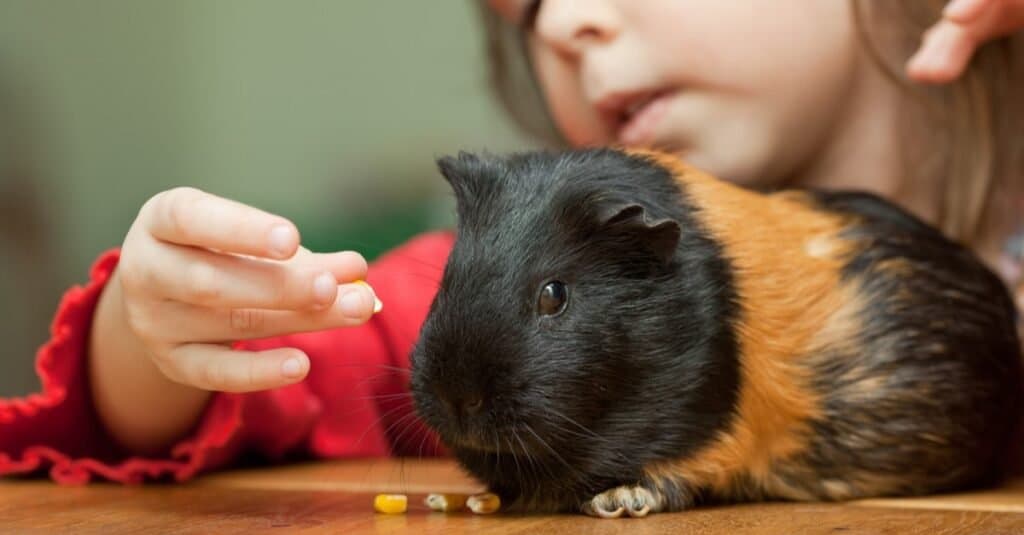
Guinea pigs are gentle pets for children, but they are small and children need to be supervised and taught to be gentle with them.
©waldru/Shutterstock.com
What Makes Guinea Pigs Not-So-Great Pets?
Like all pets, guinea pigs have their faults and they won’t be the best choice for everyone. Here are some drawbacks to consider:
- You need to have at least two of them. Seriously, do not even consider getting a guinea pig unless you can provide the space and care for a pair of them. They will be lethargic, unhappy, and shorter-lived if you keep them in solitary confinement. And other pets, even a rabbit kept in the same enclosure, are not enough.
- Although they are for the most part hardy and disease-resistant, they can get worms, mites, and other pests. They can also develop respiratory issues from poorly-kept cages or being left in a draft.
- Unlike a dog, which you can leash up and take with you on a trip, a guinea pig is bound to its habitat. Its cage and supplies can be bulky and inconvenient to transport, especially if you have a small vehicle.
- Their cages need to be cleaned regularly and often: definitely once a week, but more often if you have multiple piggies sharing a habitat. If not, they become mucked up with waste products, spilled food, and dripping water.
- As a prey species, they are naturally nervous and skittish. It takes time for them to get used to you and enjoy being cuddled without fear you’re going to eat them. It’s kind of traumatic to them when a giant hand chases them all around their house and drags them out of the only hiding place they can find.
- Sometimes when you put your finger in front of their mouth they want to take a little taste to see if it’s a carrot. You have been warned.
- Male guinea pigs eat their own poop and get impacted sometimes, requiring a vet or a knowledgeable owner to clear the blockage. Probably best for you to buy a female.
- Female guinea pigs must be kept separate from males at all times. They mature in 2-3 months and multiply like rabbits. Small pets like this are not spayed or neutered, as the anesthesia is dangerous for them.
- Guinea pigs can sometimes develop benign cysts that are like big soft pimples under the skin. It’s really best to leave these alone rather than trying to pop them. If one becomes large and you’re intent on removing it, take it to a vet, and ask them to use only a local anesthetic if possible.
- They are not hypoallergenic and they eat hay. Both of these facts can be problematic for people with allergies. On the other hand, they can be confined to one room of the house, unlike cats or dogs that spread allergens all over the house.
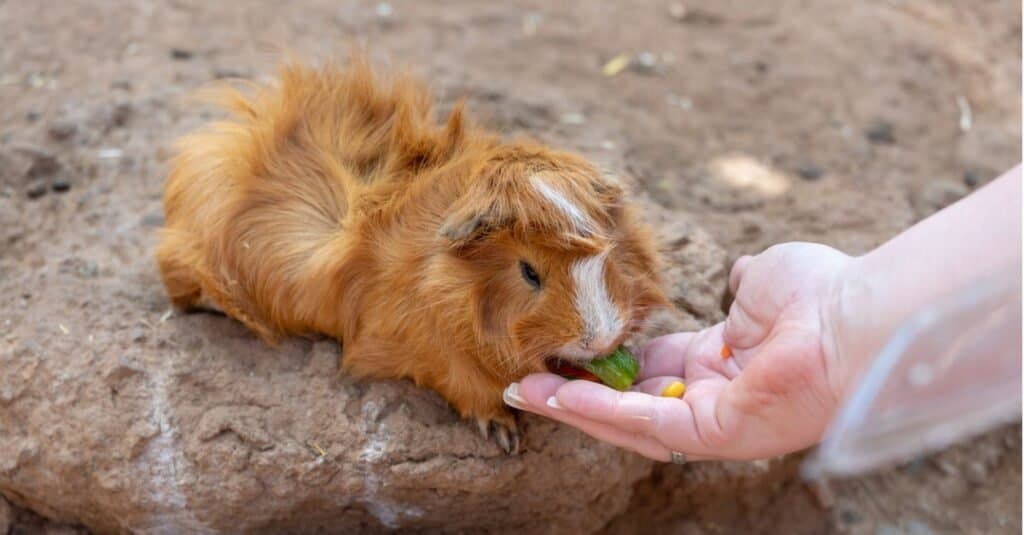
Guinea pigs can be skittish. Once they get to know you, they are affectionate pets, but at first, you need to build trust with them.
©iStock.com/Vincent Scherer
What Can You Do With a Guinea Pig?
Guinea pigs are entertaining enough, just watching them do their thing, explore their world, chew systematically through a lettuce leaf, or do some zoomies with their friend around their habitat. Some owners do like to do activities with them and teach them to do some tricks, though, and this can be a good way to build a relationship with your friend and keep it mentally stimulated. Here are some ideas of people-and-pig activities:
- Hold them while you watch tv or read a book. They will pee and poop so put a folded towel under them and give them some vegetables to chew on while you do your thing. Sometimes they like to burrow into the towel for a sense of safety.
- Set up a mini-obstacle course and lure them through it with their favorite treats.
- Tie a small treat or favorite toy to a string and let your guinea pig chase it across the floor as you drag it.
- Sit outside with them in lush, deep grass and let them graze. Either keep them in a portable enclosure or watch them carefully, though. They can bolt away quickly when they want to, and can also be in danger from stray animals or even birds of prey if you’re not close to them.
- The most useful thing you can teach them, with a great deal of patience and consistency, is to use a litter box!
- Some people are also able to train their guinea pig to shake paws, turn in a circle, beg on their back legs, come when called, push a ball or toy car, give kisses, or even play dead.
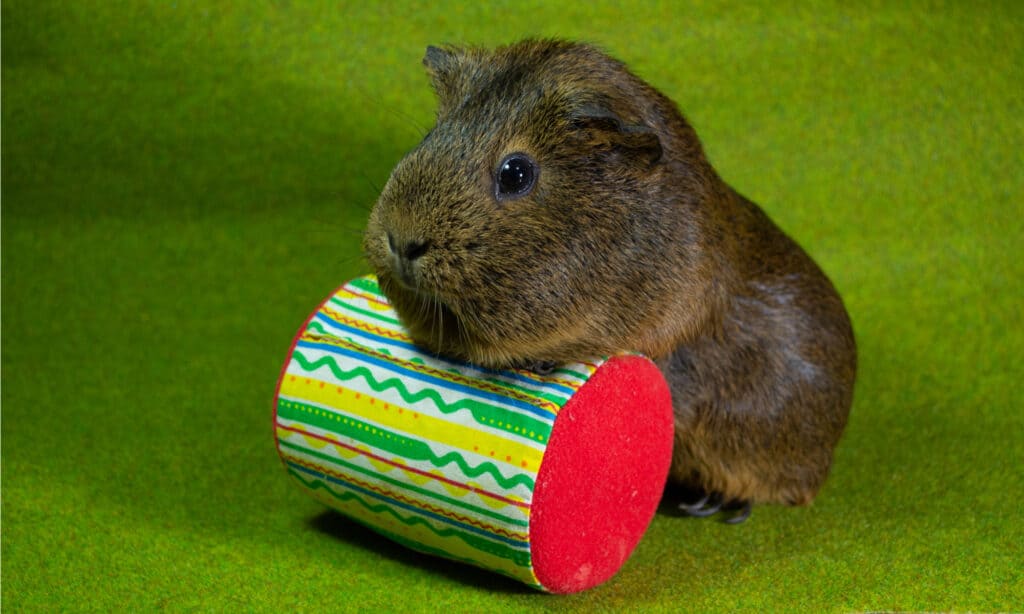
With a great deal of patience and consistency, guinea pigs can be taught some simple and entertaining tricks.
©AnBoris/Shutterstock.com
Is a Guinea Pig Right for You?
If you have a small living space, live in a place that doesn’t allow larger pets, don’t have time or energy for animals that need a lot of exercise and training, don’t want your floors and furniture ruined, don’t want to spend a lot on pet food and veterinary bills, or you want a relatively easy pet for a child or other first-time pet owner, a guinea pig might be a good choice. If you travel a lot, want an animal you can roughhouse with, or have freely roaming your house, if you’re allergic to pet dander or hay, if you are forgetful about feeding and watering a pet that is trapped in a cage, or if you have children or other pets that will be too rough and aggressive with a small animal, then it’s probably better to choose another pet. Fortunately, it’s not hard to find guinea pigs in pet stores, animal shelters, school classrooms, and homes of friends, and there are tons of videos of them online. Before making a decision, learn all you can about them and find an owner who will let you handle theirs to help you decide. But beware. If you’re on the fence, one funny little chortle out of that tubby little guy is going to make up your mind for you – meet your new little buddy!
The photo featured at the top of this post is © iStock.com/Galyna0404
Thank you for reading! Have some feedback for us? Contact the AZ Animals editorial team.






